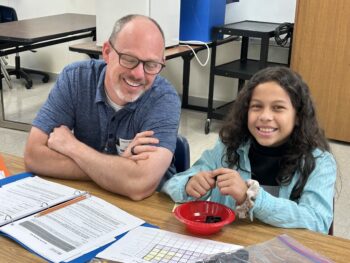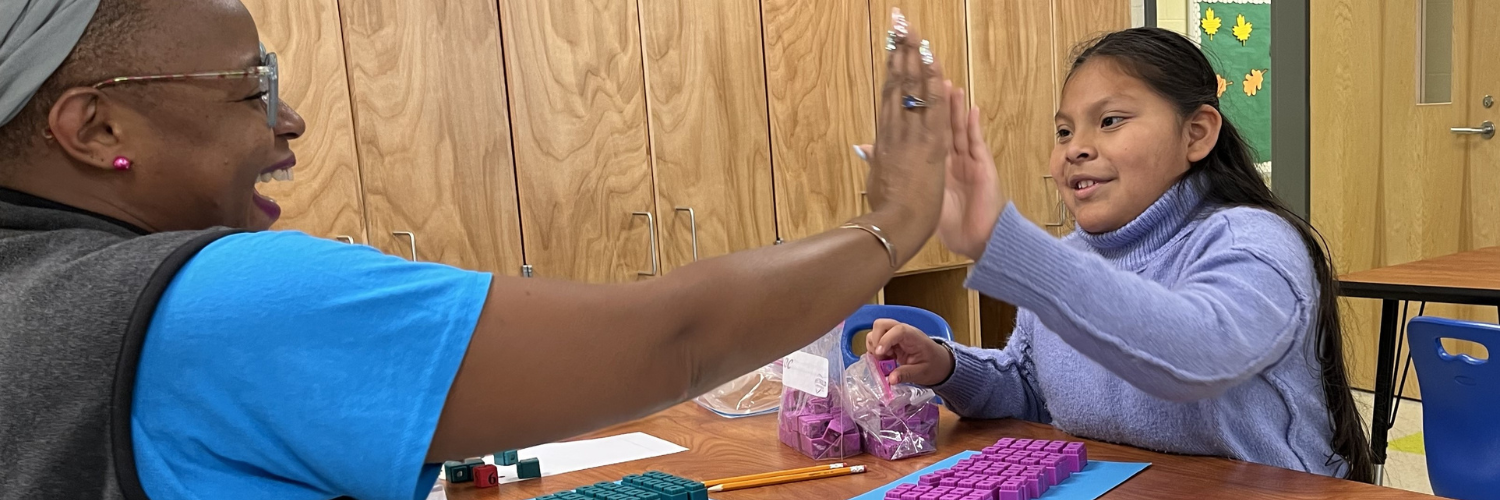
"Heart is a fantastic program with proven results. Working with the students is very rewarding and something I look forward to each week!"
2022/23 Heart Math Tutoring Volunteer at Billingsville ElementaryResults
The mission of Heart Math Tutoring (“HMT”) is to ensure all elementary students develop the strong foundation in math and enthusiasm for academics needed for long-term success, by helping schools use volunteers as tutors.
Read about the program results and the donors, volunteers, and partners behind the work in the Annual Reports here:
- Heart Math Tutoring 2024 Annual Report – Charlotte, NC
- Heart Math Tutoring 2024 Annual Report – Winston-Salem, NC
- Heart Math Tutoring 2024 Annual Report – Charleston, SC
- Heart Math Tutoring 2023 Annual Report
- Heart Math Tutoring 2022 Annual Report
- Heart Math Tutoring 2021 Annual Report
Meet a Student
Carlos was a second-grade student at a CMS Elementary School with HMT. He was an English Language Learner and was behind in several subjects. His teacher tried many interventions without success – extra support, small groups, special curriculums. She also nominated him for HMT, meaning a volunteer tutor would retrieve him from class to practice math on his level for 30 minutes twice per week. On his pre-assessment, we noticed Carlos needed help in kindergarten concepts despite being in a second-grade math class. We gave his tutor lessons corresponding to Carlos’s level. Carlos enjoyed the hands-on activities and games in tutoring, and he and his tutor persevered to reach higher levels in the curriculum. By spring, Carlos’s teacher said Carlos had what she called “an academic growth spurt.” She said, “The other day, we were practicing skip counting – you know, 5, 10, 15… and Carlos shouted out ‘this is easy!’ He is shocking me and his classmates with his newfound math skills!” By the end of the year, Carlos had scored a 90% on a common core second-grade assessment. His teacher credits much of his growth to his time spent with HMT volunteers.
Developing a Strong Foundation in Math
HMT uses assessments adapted with permission from Kathy Richardson’s Assessing Math Concepts. The assessments measure progress across twelve foundational math concepts that are proven to be critical for long-term success in math. Concepts include counting, more vs. less, decomposition to 10, ten-frame addition and subtraction, place value, and more. The program target, established under the guidance of math specialists at CMS and UNC Charlotte, is that students show growth in 2+ concepts. To date, 97% of students have met this target, ensuring that nearly every student has a measurable, meaningful benefit from the program.
In addition to growth on program pre/post assessments, Heart Math Tutoring’s program accelerates student progress on NC End of Grade Tests. Third party evaluation of the program in 2017 found positive impact on math growth on NC End of Grade Tests (EOGs) and NWEA MAP tests compared to a matched comparison group. This matches five years of internal data showing that Heart Math Tutoring students begin with scores below non-HMT students at their schools but experience more growth during the year served. Read more internal analysis on long-term impacts here.
Developing Academic Enthusiasm
Over 90% of teachers consistently report that students’ confidence and/or enthusiasm towards math increases as a result of the program. Around 60% of teachers have reported that students’ confidence increased in subjects other than math! Additionally, 96% of surveyed tutors believe they had a positive influence on students’ confidence about and understanding of math.
Satisfaction from Tutors and Teachers
While not a measure of student success, we are pleased that 99% of volunteers and over 90% of teachers consistently rate their experience with Heart Math Tutoring as positive on year-end surveys. Teachers describe benefits of clear communication, quality of instruction, and minimal time required of teachers. Above 95% of volunteers report that they would recommend HMT to friends and colleagues. (This data is based on annual surveys with 60-70% survey response rates.)


